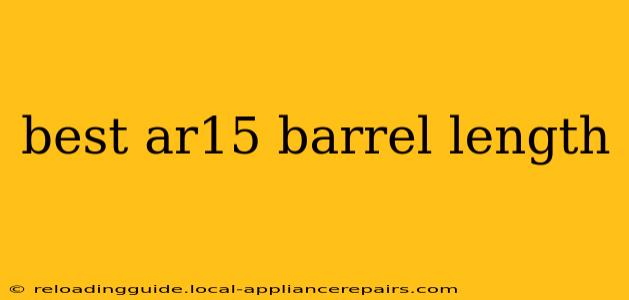Choosing the right AR-15 barrel length is crucial, impacting accuracy, velocity, weight, and overall handling. There's no single "best" length; the ideal choice depends heavily on your intended use. This guide breaks down the common barrel lengths and their respective pros and cons, helping you make an informed decision.
Understanding the Impact of Barrel Length
Barrel length significantly affects several key aspects of your AR-15's performance:
Velocity and Energy:
Longer barrels generally yield higher muzzle velocities and, consequently, more energy downrange. This translates to increased effective range and better ballistic performance. However, the gains diminish with increasing length beyond a certain point.
Accuracy:
While longer barrels can contribute to improved accuracy due to more complete powder burn, the practical difference often depends more on other factors like ammunition quality, barrel quality, and the shooter's skill. Shorter barrels can still deliver impressive accuracy, especially at closer ranges.
Weight and Handling:
Shorter barrels make your rifle lighter and easier to maneuver, ideal for close-quarters combat (CQB) or navigating tight spaces. Longer barrels, while more powerful, add significant weight and can impact maneuverability.
Gas System:
Barrel length is intimately tied to the gas system. A longer barrel might necessitate a carbine-length gas system, while a shorter barrel often uses a pistol-length gas system. The gas system's length affects how the gases cycle the action, impacting reliability and recoil.
Popular AR-15 Barrel Lengths and Their Applications:
7-inch:
- Pros: Extremely compact and lightweight, ideal for CQB and personal defense.
- Cons: Significantly reduced velocity and effective range, increased muzzle blast and flash. May exhibit reliability issues depending on the gas system.
10.3-inch:
- Pros: Good balance between compactness and performance. Suitable for CQB and home defense, offering slightly improved velocity over a 7-inch barrel.
- Cons: Still relatively short range compared to longer barrels; significant muzzle blast and flash.
10.5-inch:
- Pros: Often considered the shortest barrel length that allows for reliable suppressed operation with a standard carbine gas system.
- Cons: Similar muzzle blast and flash considerations as shorter barrels.
14.5-inch:
- Pros: A popular choice offering a good balance of accuracy, velocity, and handling. Often preferred by law enforcement and some military units. Can be pinned and welded to meet legal requirements for a 16-inch overall barrel length.
- Cons: Longer and heavier than shorter barrels.
16-inch:
- Pros: The standard military length, offering a good balance of accuracy, velocity, and handling. Widely available and often considered the most versatile length.
- Cons: Longer and heavier than shorter barrels.
18-inch:
- Pros: Improved velocity and accuracy compared to shorter barrels. Well-suited for longer-range shooting and hunting applications.
- Cons: Heavier and less maneuverable than shorter barrels.
20-inch:
- Pros: Exceptional accuracy and velocity, optimal for precision shooting and long-range applications.
- Cons: Significantly heavier and less maneuverable; not ideal for CQB or home defense.
Choosing the Right Barrel Length for You:
Consider these factors when selecting your AR-15 barrel length:
- Intended Use: CQB, home defense, hunting, long-range shooting, or general purpose?
- Desired Accuracy: How crucial is accuracy to your intended use?
- Weight and Maneuverability: How important is ease of handling and portability?
- Legal Restrictions: Check local and state laws regarding barrel lengths.
Ultimately, the "best" AR-15 barrel length is subjective and depends entirely on your individual needs and preferences. Carefully weigh the pros and cons of each length before making your decision. Remember to always prioritize safety and handle firearms responsibly.

